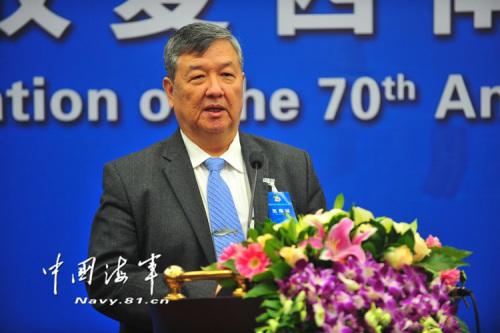 жаЙњЪеИДЮїФЯЩГШКЕК70жмФъМЭФюЛюЖЏжагЂЮФЖдееЗЂбд(8)
жаЙњЪеИДЮїФЯЩГШКЕК70жмФъМЭФюЛюЖЏжагЂЮФЖдееЗЂбд(8)

 ВЮгыЛЅЖЏЁЁ
ВЮгыЛЅЖЏЁЁ
ФЯКЃШєИЩЙњМЪЗЈТЩЮЪЬт
ИЕГЩ ЯУУХДѓбЇФЯКЃбаОПдКдКГЄ
(ИљОнТМвєећРэ)
ЁЁЁЁЮтЫОСюЃЌУчеўЮЏЃЌХЎЪПУЧЃЌЯШЩњУЧЃЌДѓМвдчАВЃЁ
ЁЁЁЁЗЧГЃШйавНёЬьгаетИіЛњЛсдкетРяОЭЙњМЪКЃбѓЗЈЃЌвдМАзюНќГіЬЈЕФФЯКЃжйВУАИЕФвЛаЉЯрЙиЗЈТЩЮЪЬтЯђИїЮЛзівЛЯТМђЕЅЕФБЈИцЁЃ
ЁЁЁЁЮвБЈИцЕФФкШнЛљБОЩЯЗжГЩвдЯТМИВПЗжЃЌЪзЯШЃЌЮввЊЧПЕїЕФЪЧЃКетИіжйВУАИБОЩэжйВУЭЅздЪМОЭВЛгІИУЪмРэетИіАИМўЃЌвђЮЊЫћВЛОпБИЙмЯНШЈЃЌетИіАИМўвВУЛгаПЩЪЪЕБЪмРэЕФвђЫиЃЌЮЊЪВУДетУДЫЕФиЃПвђЮЊСЊКЯЙњКЃбѓЗЈЙЋдМЙцЖЈЕФЗЧГЃЧхГўЃЌдкЙЋдМЕФЕкЪЎЖўВПЗжЕкЖўНкРяУцЬиБ№ЧхГўЕиЙцЖЈЃЌШчЙћвЛИіЫпЫЯЃЌАќРЈЫОЗЈКЭзМЫОЗЈЕФЃЌвВОЭЪЧЗЈдКЕФЛђепЪЧжйВУЭЅЕФГЬађЃЌВњЩњЙмЯНШЈОРЗзЕФЛАЃЌгІИУгЩЗЈЭЅздМКзіОіЖЈгаУЛгаЙмЯНШЈЁЃетЪЧЗЧГЃЧхГўЕФЃЌПДЦ№РДКУЯёЪЧгаЙмЯНШЈЕФЃЌЕЋЪЕМЪЩЯЕкШ§НкгавЛИіКмЯъЯИЕФЙцЖЈЃЌЬсГіСЫХХçЧЭтЙцЖЈЃЌвВОЭЪЧЫЕЃЌАДееЕкЖўНкЕФ288ЬѕЃЌЦфЪЕвВЪЧвЛИівЛАуЕФЗЈТЩддђЃЌШЮКЮЫОЗЈзМЫОЗЈЕФЗЈЭЅЃЌгіЕНЙмЯНШЈДцдкгыЗёЮЪЬтЕФЪБКђЃЌЫћздМКвЊзівЛИіОіЖЈЃЌетЪЧвЛАуЕФЃЌЙњФкЗЈдКвЛбљЃЌЖМЪЧетУДАьЕФЁЃЕЋЪЧЯТУцЕФЕкШ§НкЕФ298ЬѕЃЌЗЧГЃЧхГўЕиЙцЖЈЃЌШчЙћвЛИіељЖЫЩцМАЕНЯТУцетМИИівђЫиЃКРњЪЗадШЈРћЃЌЛђепЪЧАќКЌАВРэЛсгаОівщДІРэЕФОќЪТЛюЖЏЃЌЛђепЪЧЩцМАЕНСьгђжїШЈЃЌЛђепЪЧдкКЃбѓЩЯЕФЛЎНчааЖЏЃЌетаЉвђЫивЛЕЉЩцМАЕФЪБКђЃЌЕБЪТЙњгаШЈРћЪТЯШвдЪщУцЩљУїЕФЗНЪНЯђСЊКЯЙњЩљУїЃЌЮвХХГ§ЧПжЦЙмЯНЁЃжаЙњдчдк2006ФъОЭвбОЪщУцЩљУїЙ§СЫЃЌЖјзіГіетбљЩљУїЕФЙњМвВЛжЛЪЧжаЙњЃЌЪТЪЕЩЯЪРНчЩЯаэЖрЙњМвЃЌАќКЌЮвУЧСйНќЕФЖэТоЫЙЁЂКЋЙњЁЂЬЉЙњЃЌЛђепЪЧдЖвЛЕуЕФМгФУДѓЁЂвтДѓРћЁЂгЂЙњЃЌЖМЬсГіСЫЪщУцЩљУїЃЌХХГ§ЩцМАЕНИпЖШеўжЮОРЗзЕФАИМўЃЌЧПжЦЕкШ§ЗНВУОіХХГ§ЁЃЪТЪЕЩЯЃЌНёФъ7дТдкКЃбРЕФвЛИібаЬжЛсЩЯЃЌУРЙњЙњЮёдКЧАЗЈТЩЙЫЮЪЯШЩњЫНЯТИњЮвНВЫЕЃЌВЛжЛЪЧетаЉЙњМвЃЌГ§СЫ20ЁЂ30ИіЙњМве§ЪНЕФЩљУїжЎЭтЃЌУРЙњЕБФъ(ЫфШЛЯждкЛЙУЛгаЧЉЪ№СЊКЯЙњКЃбѓЗЈЙЋдМ)дкЧЉЪ№СЊКЯЙњКЃбѓЗЈЕкШ§НьЛсвщзюжеЗЈАИ ЕФЪБКђвВЬсГіСЫХХГ§жїеХЃЌвВОЭЪЧЫЕУРЙњЛЙУЛгаМгШыЙЋдМЃЌЫћвбОЩљУїСЫЃЌНЋРДЫћЪЧХХГ§етжжЧПжЦЙмЯНЕФЃЌДгЦфЫћЕФТоТэЙЋдМЃЌЬиБ№ЪЧЙњМЪаЮЪЦЗЈдКЙЋдМЕФЪЕМљРДПДЃЌУРЙњЕФетжжзіЗЈЫПКСВЛСюШЫОЊбШЃЌУРЙњвЛЙсВЛНгЪмЭтдкЕФЙмЯНШЈЁЃдкетжжЧщПіжЎЯТЃЌЗЦТЩБіЬсГіетИіАИзгЃЌОгШЛгажйВУЭЅХЄЧњСЫЗЈТЩЕФЫЕЗЈЃЌЫЕжаЙњдкетРяжїеХЕФЪТЧщЃЌЗЦТЩБівЊЧѓВУХаЕФЪТЯюВЛЩцМАЕНКЃбѓЛЎНчЃЌВЛЩцМАЕНСьгђжїШЈЃЌвВВЛЩцМАЕНРњЪЗадШЈРћЃЌЩцМАЕНРњЪЗадШЈРћЕФИњжаЙњжїеХЕФВЛвЛбљЃЌжаЙњжїеХЕФРњЪЗадШЈРћжЛЪЧЛљгкгцвЕКНааЙпР§ЖјаЮГЩЕФвЛжжЫљЮНЕФЖдгцвЕШЈЕФвЛжжРњЪЗадШЈСІЃЌЖјгцвЕШЈетИіЖЋЮїЃЌздДгжаЙњВЮМгСЊКЯЙњКЃбѓЗЈЙЋдМжЎКѓЃЌСЊКЯЙњКЃбѓЗЈЙЋдМЙцЖЈСЫEEZЕФжЦЖШЃЌОЭАбгцвЕШЈЮќЪедкзЈЪєОМУЧј EEZЕФИХФюРяСЫЁЃЫљвджаЙњдкФЯКЃЕФРњЪЗадШЈСІзюКѓЙщСуЁЃ
ЁЁЁЁетИіТпМЪЧЗЧГЃПЩаІЕФЃЌЮвШЯЮЊЃЌетИіТпМОЭКУЯёЫЕЃЌЮвЯШЖЈвхЬьЩЯЫљгаЗЩЕФЖЋЮїЖМГЦЮЊЮУзгЃЌФЧЮвФУЩБГцМСАбЮУзгЩБУ№СЫЃЌЫљвдЬьЩЯОЭУЛгаШЮКЮЗЩЕФЖЋЮїСЫЁЃетИіТпМЕФЕквЛДэЮѓОЭдкгкЖдРњЪЗЪТЪЕЕФВЛз№жиЃЌећИіжйВУГЬађРяУцвВУЛгаПДЕНЫћУЧЦИгУзуЙЛЕФжаЮФШЫВХЃЌКУКУЕиШЅбаОПжаЙњЕФРњЪЗжЄОнЃЌЫљЬсГіЕФЩйСПЕФжаЙњРњЪЗВФСЯЃЌКмУїЯдЪЧХЄЧњЕФЃЌБШШчЫЕЃЌв§гУЗЦТЩБіЕФжїеХЃЌЫЕжаЙњдк2009ФъЃЌЯђСЊКЯЙњЬсГіСНИіееЛсЃЌВХЕквЛДЮУїАзЕижїеХСЫЫћдкФЯКЃЖЯајЯпЕФРњЪЗадШЈСІЃЌетЪЧЛЌЬьЯТжЎДѓЛќЃЌвђЮЊжаЙњгаЙигкФЯКЃЕФРњЪЗадШЈСІКЭЮвУЧЖдЕКНИжїШЈЕФжїеХЃЌВЛвЊЫЕЪЧ1946ФъЃЌдчдкжЎЧАЕФвЛЁЂЖўЧЇФъжЎЧАвбНЋж№ВНЪЕЯжСЫЃЌетЬѕUаЮЯпЫфШЛЪЧдк1947ФъВХе§ЪНЖдЭтЙЋВМЃЌЕЋЪЧЃЌдк20ЪРМЭжЎГѕЃЌдкЩЯКЃУёМфГіАцЕФЕиЭМРяУцвбОЛЎСЫетЬѕUаЮЯпЃЌФЧИіЛЎЕФБШНЯДжТдЃЌБШНЯББвЛЕуЃЌУЛгаЛЎЕНББЮГ5ЖШзѓгвЕФЕиЗНЃЌвђДЫЃЌЮвУЧПЩвдКмУїАзЕФЫЕЃЌЙмЯНШЈгІИУБЛХХГ§ЃЌвђЮЊетИіАИзгЩцМАЕНжаЙњЕФРњЪЗадШЈСІЃЌЪЧЗЧГЃУїШЗЕФЁЃЦфДЮЃЌЗЦТЩБіЬсГіЖдЕКНИЗЈТЩЕиЮЛЕФХаЖЯЃЌУПвЛИіЖМЩцМАЕНжаЙњдкетИіСьгђЕФжїШЈЃЌУПвЛИіЖМЩцМАЕНЮДРДжаЙњКЭЗЦТЩБіжЎМфЕФКЃбѓЛЎНчЃЌЕБФуХаЖЯФГвЛИіЕКНИУЛга200КЃРязЈЪєОМУЧјЕФЪБКђЃЌФуЕШгквбОаћВМдкетИіЕКНИКЭЦфЫћСкЙњЕФДѓТНжЎМфУЛгажиЕўЕФ200КЃРязЈЪєОМУЧјСЫЃЌЛЎНчвбОБфГЩВЛПЩФмЁЃМДБуЪЧСьКЃЃЌШчЙћФуЖдетИіЕКНИЕФЖЈвхЯёжйВУЭЅЫљЫЕЕФЃЌКмэЇвтЭ§ЮЊЕиХаЖЯЮЊЕЭГБИпЕиЃЌФЧУДКмПЩФмСЌ12КЃРяСьКЃЖМЮоЗЈжїеХСЫЃЌЮвЫЕКмПЩФмЃЌЪЧвђЮЊЛЙгаЗЈТЩЗНУцЕФСэЭтЙцЖЈЃЌЕЋддђЩЯОЭУЛгаСЫЃЌЕБУЛга12КЃРяСьКЃЕФЪБКђЃЌФуВЛЪЧАбЮвУЧЕФЛЎНчЮЪЬтвбОИјВУХаСЫТ№ЃПЫљвдЪЕМЪЩЯЃЌНёЬьЗЦТЩБіКЭжйВУЭЅбнСЫвЛГіЯЗЃЌетГіЯЗОЭЪЧМйзАУЛгаПДЕНжаЙњШЮКЮРњЪЗжЄОнЃЌЮвВЛСЫНтетаЉЪТЧщЃЌЮвВЛСЫНтИеВХРюЙњЧПНЬЪкЫљЫЕЕФдЖзЗККЬЦвдРДЕФжаЙњдкФЯКЃЕФЪЕМљЃЌжаЙњжЛЪЧДг2009ФъПЊЪМжїеХдкФЯКЃЕФШЈСІЃЌЛЎЕФвЛЬѕЖЯајЯпЃЌЮвМйЩшФуЪВУДШЈСІЖМУЛгаЃЌШЛКѓЫЕЗжЮіЕФНсЙћЪЧЪВУДШЈСІЖМУЛгаЃЌетжжзіЗЈЪЧЮЅБГЗЈжЦЕФЃЛЕкШ§ЃЌжйВУЭЅЗИСЫвЛИіжиДѓЕФДэЮѓЃЌКЭКЃОќХѓгбЙиЯЕУмЧаЃЌОЭЪЧЖдФЯЩГЫљгаЕКНИМђЕЅХаЖЈВЛЪЧЕКЃЌШЋЪЧНИЃЌФЧУДЕККЭНИжЎМфЕФВюБ№дкЪВУДЕиЗНЃЌЪзЯШЕБЮвУЧЫЕЕКЕФЪБКђЃЌАДееСЊКЯЙњКЃбѓЗЈЙЋдМ121ЬѕЕквЛПюЙцЖЈЃЌЙувхЕФЕКЪЧЗЧГЃШнвзБЛХаЖЯЕФЃЌШЮКЮвЛПщздШЛаЮГЩЕФТНЕиЃЌБЛЫЎАќЮЇЃЌИпГБГіЯжЃЌОЭНаisland,ФЧОЭЪЧЙувхЩЯЕФЕКЃЌЕЋЪЧгааЉЕКЃЌШчЙћЬѕМўЬиБ№ВюЃЌОЭЯёЙЋдМжаЙцЖЈЕФЁАВЛФмжЇГжШЫРрОгзЁЛђБОЩэОМУЛюЖЏЕФЁБЃЌетбљЕФЙувхЕФЕКСэЭтИјЫќвЛИіУћзжНаrock(НИ)ЃЌЫќОЭВЛФмжїеХ200КЃРязЈЪєОМУЧјКЭДѓТНМмЁЃ
ЁЁЁЁЯждкАДеежйВУЭЅЕФЫЕЗЈЃЌФЯЩГШКЕКЫљгаЕКНИЭГЭГЖМЪЧrocks(НИ)ЃЌЭГЭГУЛга200КЃРязЈЪєОМУЧјЃЌЦфНсЙћЪЧЮвУЧдкФЯКЃЕФШЈСІЪмЕНСЫжиДѓАўЖсЃЌетжжШЈСІЕФАўЖсЃЌЪЧЛљгквЛИіЮоЙмЯНШЈЕФЗЈЭЅЃЌЪЕМЪЩЯОЭЪЧдкетИіЕиЗНЮвУЧУцЖдЕФетбљвЛИіОжУцЃЌЪЧвЛИіЭъШЋБЛХЄЧњЕФЮЅЗЈЕФОжУцЃЌИќживЊЕФЪЧжаЙњКЭЪРНчЩЯаэЖрЙњМввЛбљЃЌвбОЫЕУїСЫЮвХХГ§СЫЧПжЦЙмЯНЃЌФуЛЙЗЧЙмЯНВЛПЩЃЌетЪЧВЛПЩвдБЛШнШЬЕФЁЃжиЕуЪЧЕкЖўЃЌШчЙћЪЧrock(НИ)ЃЌЩаЧвЛЙКУЃЌ ЛЙга12КЃРяСьКЃАЁЃЌзнШЛУЛга200КЃРязЈЪєОМУЧјЃЌВтСПФЧРяЕФДѓТНМмЃЌЕЋжСЩйЛЙга12КЃРяСьКЃЃЌФЧУДЭтЙњДЌжЛвЊОЙ§етРяЃЌвЊааЪЛЮоКІЭЈЙ§ШЈЃЌБиаыГжајВЛЖЯЮЊЭЈЙ§ЖјЭЈЙ§ЕФДЉдНЃЌЭтЙњОќНЂБиаыЪТЯШЕУЕНЮвУЧЕФаэПЩЃЌЕБШЛКѓУцЕФЙцЖЈЃЌЪРНчИїЙњгаВЛЭЌЕФзіЗЈЃЌЕЋЖМКЯЗЈЁЃЯждкжйВУЭЅЗИЯТЕФвЛИізюДѓЕФзяЖёОЭЪЧдкЫћЕФИНДјвтМћРяУцЃЌГЌдНСЫЗЦТЩБіЕФЧыЧѓЃЌЫћдкВУОіжЎЭтЕФНсТлжаЬсГіРДЃЌжаЙњдкФЯЩГШКЕКЫљНјааЕФШЫЙЄЕКНЈЩшЙЄГЬШчКЮШчКЮЃЌЪЕМЪЩЯЕШгкжйВУЭЅЫЭИјЗЦТЩБіЛђЪЧЦфЫћРћвцМЏЭХвЛИіДѓРёАќЃЌетИіДѓРёАќОЭЪЧЃЌжаЙњдкгРЪюЁЂфОБЬетаЉЕКНИЩЯЫљНЈЩшЕФЙЄГЬЖМЪЧШЫЙЄЕКЃЌетЪЧЗЧГЃЖёЖОЕФЃЌвђЮЊШЫЙЄЕКОЭСЌ12КЃРяСьКЃЖМУЛгаСЫЃЌжЛЪЃЯТжБОЖвЛЧЇУзЕФАВШЋЧјЃЌАыОЖОЭжЛга500УзЃЌвђДЫЭтЙњОќНЂПЩвддк501ЙЋГпЕФЕиЗНХзУЊЭЃДЌЃЌЖјБЛШЯЮЊЪЧКЯЗЈЕФЃЌетЖдгкЮвУЧСьКЃвбОЙЙГЩСЫбЯжиЭўаВКЭЧжКІЃЌЖдгкЮвУЧЙњЗРЕФЗЈТЩАВШЋЁЂздЮРШЈСІЙЙГЩСЫбЯжиЕиЭўаВЁЃдкетжжЧщПіжЎЯТЃЌЮвШЯЮЊЮвУЧВЛБиПЭЦјЃЌЮвУЧгІИУЗЂЖЏвЛИіЙњМЪЩЯЕФЗЈТЩгпТлеНељЃЌвВОЭЪЧЫЕЃЌУцЖдНёЬьБЛХЄЧњЕФЃЌИпЖШХЗжожааФжївхЕФ5ИіШЫзщГЩЕФСйЪБаджЪЕФжйВУЭЅЃЌЯывЊХЄЧњИФБфОЙ§9ФъЪБМф100ЖрИіЙњМвдйМгЩЯ100ЖрИіЙњМЪзщжЏЫљЙВЭЌаЩЬЁЂЭзаЭъГЩЕФСЊКЯЙњКЃбѓЗЈЙЋдМЕФЖЈвхЃЌетИіааЮЊБиаыБЛДђЖЯЃЌБЛЧаЖЯЃЌЗёдђЃЌНёЬьПДЦ№РДЪмКІЕФЪЧжаЙњЃЌУїЬьОЭЛсЪЧЗЦТЩБіЃЌКѓЬьОЭЪЧдНФЯЃЌДѓКѓЬьОЭЪЧЦфЫћЙњМвЃЌетИіЪРНчОЭУЛгаСЫЙњМЪЗЈжЦЁЃЙњМЪЩчЛсгыЙњФкЩчЛсзюДѓЕФВЛЭЌЃЌДгЗЈжЦЙлФюРДПДЕФЛАЃЌЙњФкЗЈНаЯмЗЈЃЌЖјЙњМЪЩЯдђУЛгаЃЌЙњМЪЩчЛсНЈСЂЕФЗЈжЦвЊППжїШЈЦНЕШЁЃжйВУБОЩэдБОЪЧКЯвщЕФЁЂСйЪБзщжЏЕФЗЈЭЅРДВУОіОРЗзЕФЃЌХЄЧњСЫжйВУЕФаджЪЃЌЦЌУцЕижЇИЖЗбгУЃЌСйЪБзщГЩЃЌЭъГЩВУОіЃЌШЛКѓгУетбљЕФВУОіШЅДђАм9ФъЫљаЮГЩЕФСЊКЯЙњКЃбѓЗЈЙЋдМЃЌетБОЩэЪЧЖдЙњМЪЩчЛсШЫРрЗЈжЦЕФжиДѓЮЃКІЁЃЮвЕФНсТлОЭЪЧЮвУЧУПИіШЫвЊХЌСІЗЂЩљЃЌЕБЮвУЧУПИіШЫАбздМКЩљвєЗЂГіШЅЕФЪБКђЃЌЪРНчЩЯ13вкШЫЫЕЪЧДэЕФЃЌФЧОЭДэСЫЁЃжиЕуЪЧУПИіШЫвЊдкЙњМЪЩчЛсЩЯЗЂЩљЃЌвЊШУЮвУЧЕФЩљвєБЛЬ§ЕНЃЌШЛКѓЮвУЧВХФмШУетИіЙњМЪЩчЛсеце§НјШывЛИіе§ШЗЕиЙьЕРЃЌШЅМЬајЗЂеЙЮвУЧЕФЗЈжЦЃЌаЛаЛИїЮЛЃЁ
ЁЁЁЁIssues of International Law in South China Sea
ЁЁЁЁFu Kuncheng,
ЁЁЁЁDirector of XiamenЁЏs South China Sea Institute
ЁЁЁЁAdmiral Wu, Admiral Miao,
ЁЁЁЁLadies and gentlemen,
ЁЁЁЁGood morning! It's my honor to be here today and have this opportunity to make a brief report t about International law of the sea and some legal issues related to the recently-issued award by the South China Sea Arbitration TribunalЁЃ
ЁЁЁЁMy report can be roughly divided into the following parts. First, I want to emphasize that the Tribunal should not have accepted this Arbitration from the very beginning. Because it does not have the right of jurisdiction, and there is no appropriate reasons for the Arbitration to take over this case. The UNCLOS(United Nations Convention on the Law of the Sea) makes it very clear in Section 2, Part XII that in the event of a dispute as to whether a court or tribunal has the right of jurisdiction, the matter should be settled by that court or tribunal. It is very clear then, that although it seems to have jurisdiction, there is a very detailed article in Section 3, which makes exceptions to application of Section 2. That is to say, that Article 288 in Section 2 is a general principle of law, that any court or tribunal has to make the decision on jurisdiction when the question of whether it has jurisdiction or not comes about. This is as common as what the domestic court does. However, the following Article 298 in Section 3 clearly provides that disputes concerning historic rights, or disputes concerning military activities which the UN Security Council has made decisions to deal with, or disputes concerning territorial sovereignty or maritime delimitation, the country concerned has the right to make a statement in written form and submit to the UN, to exclude from the jurisdiction of a court or tribunal. As early as in 2006, China has made such statement, so have many other countries besides China, such as ChinaЁЏs neighboring countries Russia, Korea, Thailand, or countries a little bit faraway from China, such as Canada, Italy, and UK. These countries have made their own statements in written form to exclude jurisdiction on arbitration concerning highly political dispute. In fact, on a seminar held in Hague in July, an ex-legal advisor of White House, told me in private that besides all these 20 to 30 countries that have made formal statement, the U.S. that has not signed the UNCLOS until now, also put forward the exclusion of jurisdiction at the Final Act of the Third United Nations Conference on the Law of the Sea. That is, the U.S. has not joined in the UNCLOS while it has made statement that it excludes such compulsory jurisdiction. The U.S. does not accept external jurisdiction. The way of the U.S. doing so is not surprising at all if we review what he did as to other convention like Rome Convention, especially practices of international court. Under such circumstances, the Philippines initiated the arbitration, and the Tribunal distorted the Law, for it argued that Chinese claim and the PhilippinesЁЏs arbitral items are not concerned with maritime delimitation, or sovereignty rights, or historic rights. It argues that matters concerned about historic rights are not the same as what Chinese claims, and the historic rights claimed by China are the right of fishing, which is based on constant practice of navigation of fishery, and that since China joined in the UNCLOS, fishing rights has been absorbed into the concept of Exclusive Economic Zone according to provisions in the UNCLOS. It is concluded that ChinaЁЏs historic rights in the South China Sea return zeroЁЃ
ЁЁЁЁThis logic is ridiculous, I think, it seems that I first define whatever flies in the sky as mosquitoes. Then I kill all mosquitoes with insecticide, and say there is no flying thing at all in the sky. The first mistake in the logic is that it did not respect historical facts, nor could we see enough Chinese language experts hired in the whole arbitration procedure. They did not study Chinese historical evidence well. The small amount of Chinese historical material presented is obviously distorted. For example, the arbitration quoted PhilippinesЁЏ claim that it is not until the Chinese government submitted two notices to the United Nations in 2009 that for the first time, the Chinese government made his historic rights in the dotted line in the South China Sea understood to the world. This is the most absurd thing in the world, because two thousand years ago Chinese gradually realized their claims of the historic rights in the South China Sea and the islands sovereignty, let alone that in 1946. It was until 1947 that the U-shaped line was officially announced, but actually at the beginning of twentieth Century, the U-shaped line was drawn in the map of Non-government publication in Shanghai, although the line was relatively crude, more to the north, did not cover 5 degrees north latitude. Therefore, we can say very clearly that the jurisdiction should be excluded, it is very clear that this case involves Chinese historic rightsЁЃ
ЁЁЁЁSecond, each claim put forward by Philippines on the legal status of the islands relates to the Chinese sovereignty in this area, involving future maritime delimitation between Philippines and Chinese. When you make judgment that there should not be 200 nautical miles of Exclusive Economic Zone for an island, it means there is no 200 nautical miles of Exclusive Economic Zone overlap between this island and the land next to it, and it is impossible to make any delimitation. Even territorial waters, if your definition of this island is, as the arbitration tribunal said and unconscionably judged, low tide elevation, then even 12 nautical miles of territorial waters can probably not be claimed. The reason why I said ЁАprobablyЁБ is that there may be legal aspect of the provisions, but in principle there is not any legal aspect of the provisions. When you say there is no 12 nautical miles of territorial waters, didnЁЏt you make a judgment of delimitation issue? So in fact, today the Philippines and the arbitration tribunal performed a play together, and in the play the Philippines say that I do not see any Chinese historical evidence, I do not understand these things, I do not know what Professor Li Guoqiang has just said of Chinese practices in the South China Sea since the Han and Tang Dynasties, it is just from 2009 that Chinese began to claim its rights in the South China Sea and drew a dotted line. I presume that you have no rights, and then say the results of the analysis are that you have no rights at all. Such practice is contrary to the principle of international lawЁЃ
ЁЁЁЁThird, the arbitration tribunal made a great mistake of simply determining that all islands in Nansha are reefs instead of islands, which has great impact on NavyЁЏs operation. So what is the difference between the island and the reef? Firstly, when we say an island in accordance with the provisions of the first paragraph of Article 121 of the UNCLOS, it is very easy to judge an island in a broad sense, any naturally formed piece of land surrounded by water and emerged at high tide is called an island. That is the island of the broad sense. But some islands, if in very bad conditions, as prescribed in the Convention that ЁАcannot support human habitation or economic activitiesЁБЃЌ should then be given a name of rock in a broad sense, so it is unavailable to claim 200 nautical miles of exclusive economic zone and the continental shelf for this kind of rock.According to the arbitral tribunal, all the islands and reefs are rocks without EEZs, and so our rights in the South China Sea are greatly deprived by a tribunal without jurisdiction. In fact, this is the distorted and unlawful situation we are facing. More importantly, China, as the same as many other countries in the world, has claimed that it excludes obligatory jurisdiction, but the tribunal still intend to have jurisdiction over the South China Sea. This is cannot be tolerated.Secondly, also the key point, if the islands and reefs in the South China Sea are rocks, they still have territorial waters, even though they do not have EEZs, and so foreign ships should continually pass by the islands in the South China Sea for their right of innocent passage and must be permitted by China in advance, in the latter of which countries around the world have different practices. Now the biggest crime the tribunal has committed is that the dicta issued by the tribunal exceeds the requests of the Philippines and states that China is constructing the man-made islands, which equals a bonus for the Philippines or other interest groups from the tribunal, i.e. the islands such as Yongshu, Zhubi etc. where China is making construction projects are man-made islands. It is malicious because the man-made islands even have no territorial waters and only have safety zones with a radius of 500 meters. So, foreign ships can cast anchors within the distance of 501 meters and it is considered lawful. This poses serious threats to our territorial waters, defense security and self-defense powerЁЃ
ЁЁЁЁUnder such circumstance, I think we should not be courteous and should wage a legal and propaganda war, which is also the theme of my speech today. Faced with this distorted euro-centrist tribunal, which tries to distort and alter the definitions of the UNCLOS negotiated and compromised by more than 100 countries plus more than 100 NGOs after 9 years, its actions must be stopped, otherwise today China is the victim, while the Philippines. Vietnam and other countries will be the next tomorrow, and the international laws will be ruinedЁЃ
ЁЁЁЁFrom the perspective of legal system, the biggest difference between the international society and the domestic one is the constitution, which is the ceiling for the domestic law, while there is no such thing in the international laws. The legal system set up in the international society is based on equality of sovereignty. The arbitration should be collegial and temporarily organized to settle disputes, while the Philippines unilaterally pay the costs and tries to use the adjudication to defeat the UNLOS, which is distorting the nature of arbitration and is a serious hazard to the human legal system of the international societyЁЃ
ЁЁЁЁMy conclusion is that every one of us should make his or her voice heard. When we do so and the 1.3 billion people of the world people say it is wrong, then it is actually wrong. The most important thing is that every one should make his or her voice heard in the international society. Only then can the international society enter into a right track and the legal system continue to develop. Thank you all!
>ОќЪТаТЮХОЋбЁЃК
- ЁЄ81192ЃЌвбЮоЗЈЗЕКНЃЛжаЙњКЃОќЃЌЧыМЬајЧАНјЃЁ
- ЁЄЙњЗРВПЃКжаЙњЙњЗРЭЖШыКЯРэЪЪЖШ ЕкЖўЫвКНФИКЮЪБЗўвл
- ЁЄжаЙњЕкЖўЫвКНФИКЮЪБЗўвлЃП ЙњЗРВПИјГізюаТЛигІ
- ЁЄЖэФтбаЗЂЮоШЫАцT-90ЬЙПЫ НЯУРХЗЭЌРрЮфЦїЁАММИпвЛГяЁБ
- ЁЄзуВЛГіЛЇЕФзЯНћЮРЪПЃКВЛЩйШЫСЌУЋжїЯЏМЭФюЬУЖМУЛШЅЙ§
- ЁЄ2019ОќЖгЮФжАШЫдБеаПМНёЦ№БЈУћ дѕУДБЈУћЁЂПМЪВУДЃП
- ЁЄКЃОќвЛеНЛњбЕСЗЪБЪЇЪТжТ2УћЗЩаадБЮўЩќ двђД§ЕїВщ



















